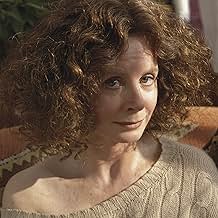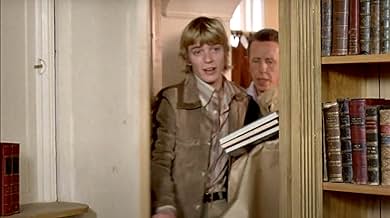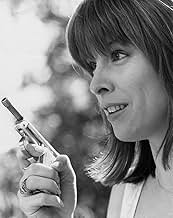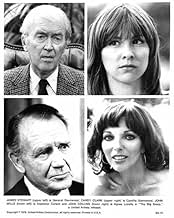अपनी भाषा में प्लॉट जोड़ेंA grizzled American private detective in England investigates a complicated case of blackmail-turned-murder involving a rich but honest elderly general, his two loose socialite daughters, a ... सभी पढ़ेंA grizzled American private detective in England investigates a complicated case of blackmail-turned-murder involving a rich but honest elderly general, his two loose socialite daughters, a pornographer, and a gangster.A grizzled American private detective in England investigates a complicated case of blackmail-turned-murder involving a rich but honest elderly general, his two loose socialite daughters, a pornographer, and a gangster.
- Karl Lundgren
- (as Simon Turner)
फ़ीचर्ड समीक्षाएं
And that's what makes it so difficult to transfer his works to the screen. You almost have to have a voice-over from Philip Marlowe otherwise you not only get lost in the various plot twists but you miss the adamantly low-brow tropes -- "her hair was the color of gold in old paintings," or, "she threw me a glance I could feel in my hip pocket." "Chinatown," set in 1937 LA, was released to great critical and public acclaim in 1974. The very next year, Robert Mitchum tackled Philip Marlowe in "Farewell, My Lovely" and he was great, and so was the production, even if it was not the masterpiece that "Chinatown" was. Nobody will ever make a masterpiece out of a Chandler story because, after all, a masterpiece usually starts out with a coherent plot.
So the trick is to capture on screen what Chandler's prose evokes on the written page. Style is everything. "Farewell My Lovely" had it. "The Big Sleep," alas, doesn't. The director hasn't really done much to help things. In the 1946 version of "The Big Sleep," Howard Hawks at least had some fun with the characters. (Bogart and the horn-rimmed glasses in the book shop.) Hawks also allowed some humor in the dialog. ("She tried to sit in my lap while I was standing up.") Philip Marlowe with his resolutely seedy presence belongs in the marginal zone of Los Angeles, not in the uptrodden neighborhoods of London. He belongs in a trench coat, wearing an older fedora, not in the powder blue suits of Saville Row. ("I own a hat and a coat and a gun," he tells Nulty in "Farewell My Lovely," "and everything I touch turns to s***.") In this film we have to put up with a confident and compassionate Marlowe, striding through the fancy decor instead of slouching, never touching a drop of alcohol. And Mitchum doesn't add much to the story besides his usual heft. As James Agee once said of him, his casual languor suggests Bing Crosby supersaturated on barbiturates.
That reminds me. I couldn't help wondering, while I watched this, how much booze had gone into the production. I forget whether Chandler had quit drinking by the time he wrote this, but Mitchum himself was hardly an amateur. Olivier had kicked Cyril Cusack out of the Old Vic for showing up drunk for a performance of "Doctor's Dilemma" and reciting lines from another of Shaw's plays. Richard Boone was evidently immobilized during his last few years and Oliver Reed died of drink.
Still, look at the actors in this thing. In support are Edward Fox, Harry Andrews, James Donald, Colin Blakely, James Stewart, and Richard Todd. And all of them are up to the task, true professionals, with not a hollow note struck. I'm tempted to call the cast "peerless" but I don't know if it's permitted if there's a theatrical knight among them. Richard Boone is outstanding as Canino -- a villainous wreck, hobbling about on a broken foot, cackling over his own sliminess, howling with unrestrained glee as he watches a harmless little man whom he has just poisoned crash through a glass door and die.
Also notable are the locations and the art direction. It may not be sleazy Los Angeles in 1941 but London and its interiors look just fine. London has never looked less grimy. There is no rain or fog, the streets are clean, narrow and lined with classy book shops, and people tend to drive new and expensive cars.
Well, the movie is done with dash and style, no doubt about that. But it's the wrong style. Marlowe belongs in the 1940s. In the 1940s pornography and dope could get you serious jail time -- just ask Mitchum.
I didn't much care for it the first time I saw this. The second time was easier going because I'd lowered the bar of my expectation.
That's where the 1978 version excels - and fails. Let's start with the fails. In the original, the scenes in the bookshops near the beginning rule with Bogie's use of humour and the electric suggested tryst with Dorothy Malone's character. Sometimes the suggestion can be erotic enough. Perhaps that's why this version skips the fun and the implied sex for another more mundane approach.
The other fail is the atmosphere. This version lacks any. The original's shadows and textures evoked each scene and created moods. This version lacks any specific mood to instead tell a story in almost a heightened reality. The direction does the same, relying on straight-ahead narrative more like a TV movie than a theatrical film.
There's so much more here that succeeds. Despite his age, Mitchum is a fine Marlow, more cynical and world-weary than Bogart's version. The script is sharp, full of humour and wry observations. The biggest improvement is the depiction of sex. Freed of the tyranny of the forties' censorship, scenes like Carmen naked and stoned are much more realistic and make a more satisfying treatment, even if the innuendo is not as predominant.
OK, it's not the classic it could've been. It's still a decent flick to rent or watch on cable. Marlowe is solid, Candy Clark is wonderfully loony, Joan Collins is pure kitsch, Richard Boone plays the essence of evil. It's good to see James Stewart, even if his gentle disposition doesn't quite match the demeanour of a General. The supporting cast are almost uniformly intriguing and fun to watch. And what a cast!
The Big Sleep may be no masterpiece but it is great fun. Relax your expectations and enjoy it for what is - fine entertainment.
Winner treats this material with quite a bit of humor, rendering it positively silly on a frequent basis. It makes one believe that he had contempt for it. But Chandlers' story is fortunately still engrossing, and it's the kind of thing that really keeps viewers on their toes, trying to pay attention to all the details and twists. (Since there's much exposition to digest, viewers can't afford to let their attention wander.) The film *looks* absolutely great, with fine use of locations and lovely photography. It's spiced up with some (tastefully done) nudity, but it's never ever very violent.
The main draw is a sterling group of American and British actors. Sarah Miles, Richard Boone, Joan Collins, Edward Fox, John Mills, Oliver Reed (typically amusing as a threatening gangster / casino owner), Harry Andrews, Colin Blakely, Richard Todd, Diana Quick, and James Donald are all present and accounted for. Mitchum anchors the proceedings with his colorful performance, but dragging things down quite a bit is the way overdone airhead shtick by Candy Clark, playing Sternwoods' younger daughter. Usually she's pretty reliable, but here she's much too annoying. Mitchum and company do have fun with the sometimes witty and lively dialogue.
Well paced, and fairly energetic, but overall not especially memorable. Some people might want to just revisit the Bogie and Bacall version instead.
Six out of 10.
But Richard Amsel's poster is great!
For one reason or another, Michael Winner has decided to move things over to England; although the lead man remains American. This change in location has not really had an effect on the story; but it did leave Winner free to recruit an excellent roster of British stars. Among the names in the cast list are Oliver Reed, John Mills, Joan Collins, Richard Boone and Edward Fox. The film is lead by Robert Mitchum, who while not as great as Humphrey Bogart, still makes an excellent leading man and there's also enough room in the cast for an aging James Stewart. The film is a lot shorter than the earlier version of this story and Winner has really trimmed things down a lot, which means that the story is much more straight forward than it was in the 1946 film. This is not really a bad thing as it does mean that the film is easier to follow; although it also seems less expansive. The characters take something of a backseat too, with only the lead character getting any real development. Still, this is at least an entertaining thriller and I don't feel like I wasted my time watching it; although Howard Hawks' version is better.
क्या आपको पता है
- ट्रिवियाJames Stewart had difficulty saying his lines on time due to hearing and possibly memory problems. Some of the cast were shocked by his aged appearance. Robert Mitchum recalled, "The picture was all about corpses, but Jimmy looked deader than any of them." Stewart actually outlived Mitchum by one day, nearly 20 years later.
- गूफ़When Marlowe takes the gun from Camilla after she unloads it on him with multiple blank rounds, he grabs the barrel with his bare hands. That should have proved to be very painful as the barrel would be extremely hot.
EDIT: This is incorrect. Blank cartridges in a small calibre gun will not heat the barrel to any great extent. A gun barrel gets hot mainly due to the friction of the bullet going through the barrel, not from the powder in the cartridge.
- भाव
Charlotte Sternwood: [when Marlowe declines to blackmail her] Wha-? You don't want money?
Philip Marlowe: Oh sure. All I itch for is money. I'm so greedy that for fifty pounds a day plus expenses on the day I work, I risk my future, the hatred of the cops, of Eddie Mars and his pals, I dodge bullets and put up with slaps and say "Thank you very much. If you have any further trouble please call me: I'll just put my card here on the table." I do all that for a few pounds. And maybe just a little bit to protect what little pride a sick and broken old man has in his family, so that he can believe his blood is not poisoned. That his little girls - though they may be a trifle wild - are not perverts and killers.
- कनेक्शनFeatured in James Stewart, Robert Mitchum: The Two Faces of America (2017)
टॉप पसंद
विवरण
- रिलीज़ की तारीख़
- कंट्री ऑफ़ ओरिजिन
- भाषा
- इस रूप में भी जाना जाता है
- Tote schlafen besser
- फ़िल्माने की जगहें
- Knebworth House, Knebworth, Hertfordshire, इंग्लैंड, यूनाइटेड किंगडम(Sternwood Mansion)
- उत्पादन कंपनियां
- IMDbPro पर और कंपनी क्रेडिट देखें
बॉक्स ऑफ़िस
- बजट
- £30,00,000(अनुमानित)
इस पेज में योगदान दें






































